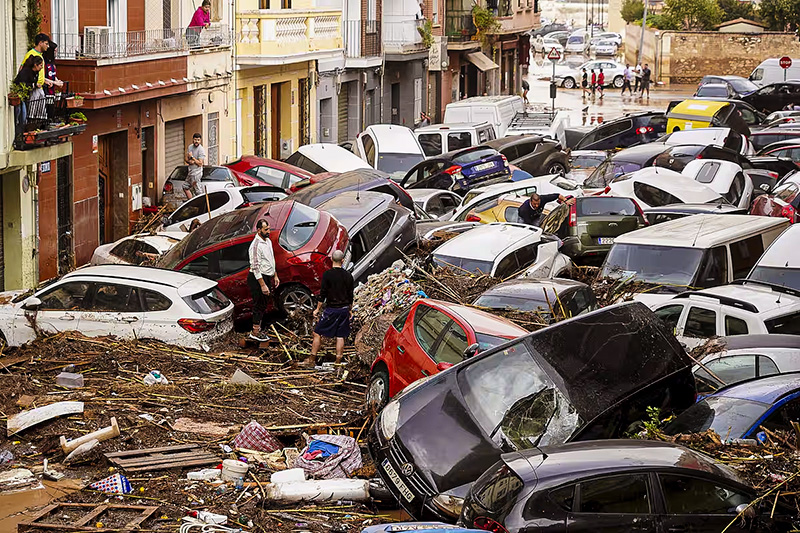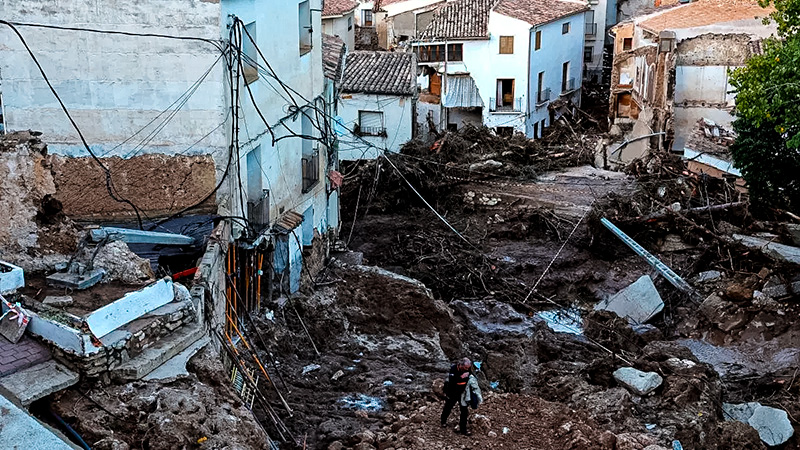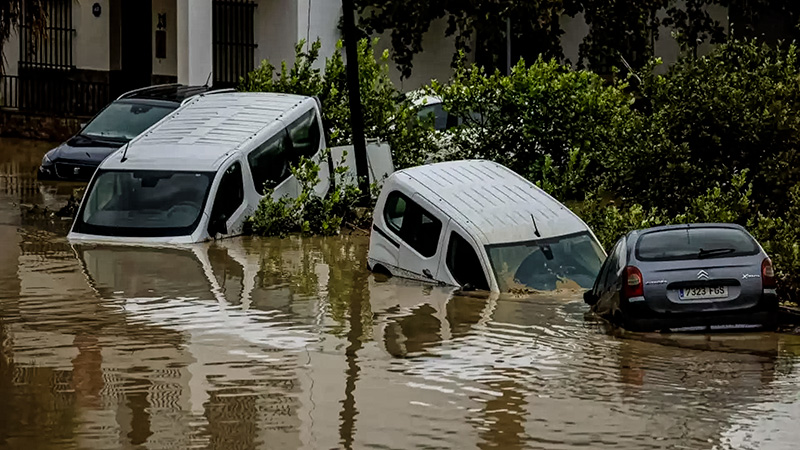News
 (Dana) Devastation in Valencia
- 01/11/2024 » 12:56 by cronywell
(Dana) Devastation in Valencia
- 01/11/2024 » 12:56 by cronywell
Three days after historic flash floods swept through several towns south of Valencia in eastern Spain, killing at least 205 people, the initial shock gave way to anger, frustration and a wave of solidarity on Friday. Spanish emergency authorities raised the death toll to at least 205 victims, 202 of them in Valencia alone. Many streets were still blocked by vehicles and piled-up debris, in some cases trapping residents in their homes. Some places remained without electricity, running water or stable telephone connections.
 The damage from Tuesday and Wednesday's storm was reminiscent of the effects of a tsunami, with survivors picking up the pieces as they mourned loved ones lost in the deadliest natural disaster in Spain's living memory. "The situation is unbelievable. So much disaster and so little help," said Emilio Cuartero, a resident of Masanasa, outside Valencia. “We need machinery, cranes, to make the sites accessible. We need a lot of help. And bread and water.” In Chiva, residents were working on Friday to clear debris from mud-filled streets. The Valencian town received more rain in eight hours on Tuesday than in the previous 20 months and water overflowed a ditch that runs through the town, tearing away roads and walls of houses. Mayor Amparo Fort told RNE radio that “whole houses have disappeared, we don’t know if they have people inside or not.” Security forces and soldiers were working to search for an unknown number of missing people and many were feared still trapped in wrecked vehicles or flooded garages. Chiva resident Juan Vicente Perez said in statements near the site of his former home that if he had waited five more minutes before evacuating, he would have died.
The damage from Tuesday and Wednesday's storm was reminiscent of the effects of a tsunami, with survivors picking up the pieces as they mourned loved ones lost in the deadliest natural disaster in Spain's living memory. "The situation is unbelievable. So much disaster and so little help," said Emilio Cuartero, a resident of Masanasa, outside Valencia. “We need machinery, cranes, to make the sites accessible. We need a lot of help. And bread and water.” In Chiva, residents were working on Friday to clear debris from mud-filled streets. The Valencian town received more rain in eight hours on Tuesday than in the previous 20 months and water overflowed a ditch that runs through the town, tearing away roads and walls of houses. Mayor Amparo Fort told RNE radio that “whole houses have disappeared, we don’t know if they have people inside or not.” Security forces and soldiers were working to search for an unknown number of missing people and many were feared still trapped in wrecked vehicles or flooded garages. Chiva resident Juan Vicente Perez said in statements near the site of his former home that if he had waited five more minutes before evacuating, he would have died.
 Images from Valencia before and after the disaster showed the scale of the catastrophe, which had turned the Mediterranean city into a landscape of murky waters. The V-33 motorway was stained brown by a thick layer of mud. The tragedy has unleashed a wave of local solidarity. Some residents in towns such as Paiporta, where at least 62 people died, and Catarroja, have walked kilometres to Valencia to get supplies, passing neighbours from unaffected areas who bring water, essential products or shovels to help remove the mud. The large number of people coming to help led the authorities to ask them not to drive there, because they were blocking roads needed for emergency services. In addition to contributions from volunteers, associations such as the Red Cross and local councils were distributing food. And as the authorities repeated again and again, more storms were expected. The State Meteorological Agency (Aemet) issued warnings for heavy rain in Tarragona, Catalonia, as well as in parts of the Balearic Islands. Meanwhile, flood survivors and volunteers were focused on the titanic task of clearing an ever-present layer of thick mud. “This is a disaster. There are many elderly people who do not have medicine. There are children who do not have baby food. We do not have milk, we do not have water. We do not have access to anything,” a resident of Alfafar, one of the worst-affected towns in southern Valencia, told state broadcaster TVE. “Nobody has come here even to warn us on the first day.” Juan Ramón Adsuara, the mayor of Alfafar, one of the worst-affected towns, said that the aid was not enough for residents trapped in a “critical situation.” “There are people living with corpses at home, that is very sad. We are organizing ourselves, but we are running out of everything,” he told reporters. “We go to Valencia with the vans, we shop and we come back, but here we are totally forgotten.” The rushing water turned narrow streets into death traps and created torrents that swept away homes and businesses, leaving many uninhabitable. There was some looting in shops, and authorities arrested 50 people. Social media has channelled the needs of those affected. Some posted images of missing people in the hope of obtaining information about their whereabouts, while others launched initiatives such as Suport Mutu – or Mutual Support, in Valencian – that connected requests for help with people offering it. Others organised collections of basic goods across the country or started fundraisers.
Images from Valencia before and after the disaster showed the scale of the catastrophe, which had turned the Mediterranean city into a landscape of murky waters. The V-33 motorway was stained brown by a thick layer of mud. The tragedy has unleashed a wave of local solidarity. Some residents in towns such as Paiporta, where at least 62 people died, and Catarroja, have walked kilometres to Valencia to get supplies, passing neighbours from unaffected areas who bring water, essential products or shovels to help remove the mud. The large number of people coming to help led the authorities to ask them not to drive there, because they were blocking roads needed for emergency services. In addition to contributions from volunteers, associations such as the Red Cross and local councils were distributing food. And as the authorities repeated again and again, more storms were expected. The State Meteorological Agency (Aemet) issued warnings for heavy rain in Tarragona, Catalonia, as well as in parts of the Balearic Islands. Meanwhile, flood survivors and volunteers were focused on the titanic task of clearing an ever-present layer of thick mud. “This is a disaster. There are many elderly people who do not have medicine. There are children who do not have baby food. We do not have milk, we do not have water. We do not have access to anything,” a resident of Alfafar, one of the worst-affected towns in southern Valencia, told state broadcaster TVE. “Nobody has come here even to warn us on the first day.” Juan Ramón Adsuara, the mayor of Alfafar, one of the worst-affected towns, said that the aid was not enough for residents trapped in a “critical situation.” “There are people living with corpses at home, that is very sad. We are organizing ourselves, but we are running out of everything,” he told reporters. “We go to Valencia with the vans, we shop and we come back, but here we are totally forgotten.” The rushing water turned narrow streets into death traps and created torrents that swept away homes and businesses, leaving many uninhabitable. There was some looting in shops, and authorities arrested 50 people. Social media has channelled the needs of those affected. Some posted images of missing people in the hope of obtaining information about their whereabouts, while others launched initiatives such as Suport Mutu – or Mutual Support, in Valencian – that connected requests for help with people offering it. Others organised collections of basic goods across the country or started fundraisers.

Spain's Mediterranean coast is accustomed to autumn storms that can cause flooding, but this was the most severe flash flood in recent memory. Scientists link it to climate change, which is also behind rising temperatures and droughts in Spain and the warming of the Mediterranean Sea. Man-made climate change has doubled the likelihood of a storm like this week's deluge in Valencia, according to a partial analysis released Thursday by World Weather Attribution, a group of dozens of international scientists who study the role of global warming in extreme weather. Spain has suffered a drought for nearly two years, which worsened flooding because dry soil was so hard it couldn't absorb water. Meanwhile, efforts continue to search for missing people and rehabilitate homes, streets and infrastructure. Since Friday morning, 500 more soldiers have joined the search efforts, along with the 1,200 UME soldiers deployed from almost the first moment.
